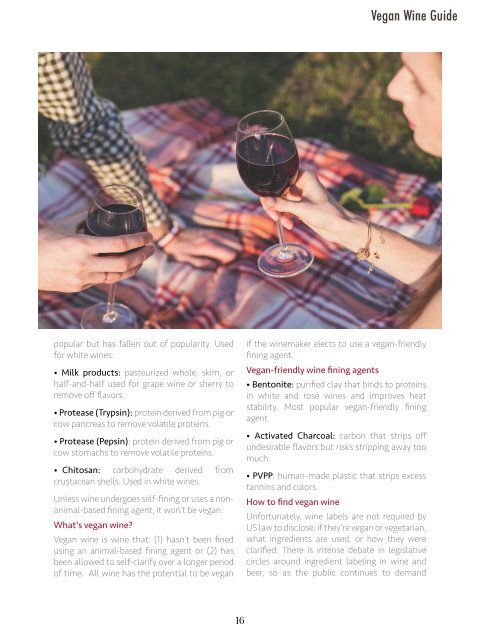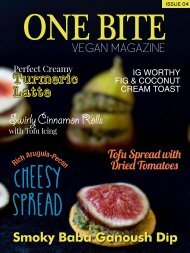One Bite Vegan May 2019
Create successful ePaper yourself
Turn your PDF publications into a flip-book with our unique Google optimized e-Paper software.
<strong>Vegan</strong> Wine Guide<br />
<strong>Vegan</strong> Wine Guide<br />
transparency, I would anticipate this law will<br />
evolve. Some winemakers are choosing to<br />
voluntarily include this information but the vast<br />
majority do not label ingredients yet.<br />
The more customer demand for ingredient<br />
labeling and vegan wines, the more likely that<br />
winemakers will start producing wines that<br />
everyone can drink.<br />
Popular vegan wines<br />
Don’t have time to hunt down a vegan bottle?<br />
Here are five options that are widely available to<br />
get you started.<br />
Therefore, when looking for vegan wine, there<br />
are two main options: wines labeled as “unfined”<br />
or those that specifically state they’re vegan<br />
friendly.<br />
popular but has fallen out of popularity. Used<br />
for white wines.<br />
• Milk products: pasteurized whole, skim, or<br />
half-and-half used for grape wine or sherry to<br />
remove off flavors.<br />
• Protease (Trypsin): protein derived from pig or<br />
cow pancreas to remove volatile proteins.<br />
• Protease (Pepsin): protein derived from pig or<br />
cow stomachs to remove volatile proteins.<br />
• Chitosan: carbohydrate derived from<br />
crustacean shells. Used in white wines.<br />
Unless wine undergoes self-fining or uses a nonanimal-based<br />
fining agent, it won’t be vegan.<br />
What’s vegan wine?<br />
<strong>Vegan</strong> wine is wine that: (1) hasn’t been fined<br />
using an animal-based fining agent or (2) has<br />
been allowed to self-clarify over a longer period<br />
of time. All wine has the potential to be vegan<br />
if the winemaker elects to use a vegan-friendly<br />
fining agent.<br />
<strong>Vegan</strong>-friendly wine fining agents<br />
• Bentonite: purified clay that binds to proteins<br />
in white and rosé wines and improves heat<br />
stability. Most popular vegan-friendly fining<br />
agent.<br />
• Activated Charcoal: carbon that strips off<br />
undesirable flavors but risks stripping away too<br />
much.<br />
• PVPP: human-made plastic that strips excess<br />
tannins and colors.<br />
How to find vegan wine<br />
Unfortunately, wine labels are not required by<br />
US law to disclose: if they’re vegan or vegetarian,<br />
what ingredients are used, or how they were<br />
clarified. There is intense debate in legislative<br />
circles around ingredient labeling in wine and<br />
beer, so as the public continues to demand<br />
• “Unfined” wines: allowed to self-clarify<br />
over time. There are an increasing number of<br />
winemakers who want to create wine in the<br />
most natural way possible and believe that<br />
fining agents strip out too much of wine’s<br />
natural flavors and colors. Intervention is kept<br />
to a minimum.<br />
• <strong>Vegan</strong>-friendly labels: this is a voluntary choice<br />
by winemakers. Some brands choose to selfidentify<br />
as vegan and some brands are vegan but<br />
do not label themselves as such. I’ve included an<br />
overview of common vegan winemakers below.<br />
Beyond the label, I recommend consulting with<br />
your local wine shops, talking to the sommelier<br />
at a restaurant, doing a quick Google search of<br />
your favorite vineyards and potential purchases,<br />
and consulting the Barnivore. The Barnivore is<br />
a comprehensive database that covers vegan<br />
wine, beer, and liquor.<br />
If you find exceptional vegan wines, spread the<br />
word and thank the businesses that carry them!<br />
(1) Frey Vineyards: vegan, organic, biodynamic,<br />
and produced without any added sulfites or<br />
synthetic preservatives. The winery produces<br />
a wide range of wines from Chardonnay to<br />
Cabernet Sauvignon to Pinot Noir and rosé.<br />
Based in Mendocino County, California.<br />
(2) La Crema: vegan wine produced sustainably<br />
with approval by the Certified California<br />
Sustainable Winegrowing Alliance. La Crema<br />
produces a range of varietals and is based in<br />
Sonoma, California.<br />
(3) Meiomi: produced in Monterey, Sonoma,<br />
and Santa Barbara, California. Only their Pinot<br />
Noir and Chardonnay are vegan so make sure to<br />
look at your labels carefully.<br />
(4) Moët & Chandon: sparkling vegan wine<br />
alert. Powerhouse champagne producer Moet.<br />
(5) Sutter Home: if you’re on the prowl<br />
for some cheap vegan wine that is literally<br />
available almost everywhere, look for Sutter<br />
Home Riesling, Zinfandel, Cabernet Sauvignon,<br />
Gewürztraminer, and Chenin Blanc. Not my<br />
favorite from a drinking perspective but it does<br />
win points for being vegan and widely available.<br />
<strong>Vegan</strong> wine pairing<br />
So now you have a bottle of vegan wine but<br />
you’re not quite what to make for dinner. Look<br />
no further.<br />
When you have a vegan meal, focus on pairing<br />
with the most prominent flavors. For example,<br />
if you have spaghetti with a tomato sauce, focus<br />
on the acidic tomato flavors. If you have a vegan<br />
bowl with veggies, tofu, and a cashew based<br />
16 17



